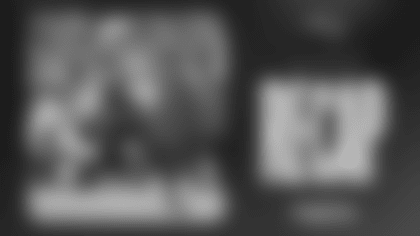**
BB: **Happy Holidays. It's a little early but…Alright we're here on the Texans. We've had three games against them in a pretty short amount of time, from two at the end of last year and then here we are. Going back and looking at those games and looking at the Texans this year, I really see a lot of similarities. There are a lot of the same players. They've obviously added a few players, a few young players and a couple veteran players too. But a very good football team, a very talented team. Obviously they're outstanding on defense. Very disruptive front seven, it's not just [J.J.] Watt. You don't lead the league in defense with just one player. He's certainly outstanding but they have a good group of players, good in the secondary. Offensively, it's a very good offensive line. They do a good job with the running game like they always do. Good receivers, getting some production at tight end, good backs, very athletic quarterback. They added [Shane] Lechler, he's a big punter; excellent returner in [Keshawn] Martin. A lot of good football players, again a team that looks very much like the team we saw last year in December and January. I know the record is different but when you look at the film, I see a very similar-looking team. They've lost a couple tough, close games, which we've all been there before. They're a play or two away from having a lot of wins. That's a team that we've got to be ready to play. It's a good football team, a team that's really been in every game here the last five, six weeks. We haven't won on the road here in the last three outings, so we need to find a way to play better away from home, whatever that consists of: better coaching, we'll start with that and obviously better playing.
Q: Are you a white meat or dark meat guy?
BB: Whatever is on the plate. I haven't turned down a lot of food in my Thanksgiving lifetime.
Q: All the fixings?
BB: Whatever is on there. I make sure to leave room for pumpkin pie. I don't want to fill up on everything and not be able to eat that pie.
Q: How did Dane Fletcher perform the other night?
BB: I think he stepped in there and did a good job. It certainly wasn't perfect; there wasn't much that was perfect defensively. But he definitely steeped in and made some plays. I thought he competed well. We just have to do a better job overall defensively. He and Jamie [Collins] both had a number of plays on defense and also their role in the kicking game. They really stepped up and made some solid contributions in those two phases of the game. He did a good job.
Q: He hadn't played as much early in the year in terms of snaps. Do you have to make sure guys maintain that focus and attention even though they're not getting 30 or 40 plays in a game?
BB: That's the way it always is. There's not really – it might change from player to player but when you have a team – 53 players, 46 active – you go into every game with certain guys' expectation of high play time and other guys not as much. But we all know that could change on any play, at any position, at any time. That's every player's job. We stress that on a weekly basis. Every player's job is to be ready to go. It doesn't make any difference what your role is. Obviously the most critical part of the game is the end of the game, not to minimize any other part but that's the most critical part. It could be the next-to-last play of the game, it could be the middle of the fourth quarter, it could be halftime, whenever it is, but when that time comes, we're all counting on you. That's their opportunity and as we all know, if you take advantage of those opportunities, then usually more will come. If you don't, fewer will come or they'll get passed along to somebody else. But the whole linebacker thing obviously changed when we lost Jerod [Mayo]. I mean he almost never came off the field. Now where he would normally be sometimes is handled by one player or sometimes more than one.
Q: There have been some untimely third-and-longs given up by the defense. At this point of the year, how big of a concern is that for you?
BB: Turnovers, third down and red area are the three most important things. Any third-and-long that we give up is untimely. There's no timely third-and-long conversions defensively, none. Yeah, we have to do a better job on third down. We have to do a better job in the red area [on] both sides of the ball. We have to do a better job with the turnovers. There's no getting around those.
Q: A couple guys talked about you guys simulating in practice coming out of halftime and jumping right into the third quarter. How does that work logistically?
BB: Just like that. I mean, we can't simulate it, but we get part of the way through practice and stop and then finish the practice and kind of simulate, as much as we can, that situation. The focus, sometimes there is some play-calling or adjustments that we might anticipate and say, 'OK, we're probably thinking about using this more in the second half than the first half.' But that's not a big thing. There might be a couple things that fall into that category but that's not a high percentage thing; just the mentality and emphasis.
Q: Have you seen that pay off?
BB: I don't know. It looked like it in the Miami game. It looked like it in the Pittsburgh game. I don't know.
Q: Chandler Jones has had a quarterback hit in almost every game. Is that reflective of a guy that's played pretty consistently in his second season?
BB: Yeah, I think Chandler has played much more consistently this year than last year. Although I thought he did a lot of good things last year too, but his game has come up and we've asked him to do more. He's taken on more responsibilities, played in different positions but I think he's having a solid season. He comes to work every day. He's improved on a consistent basis. Like I said, we've asked him to do different things. He's worked hard at those and gotten better at them and that's helped our team.
Q: Has his role changed with some of the guys you lost up front? Have you asked him to do different things since then?
BB: Well, every week, whatever we need to do defensively to win, that's what we do. I'm just saying, that's what it was a year ago, five years ago, 10 years ago, four days ago.
Q: Even leadership-wise, since those guys went down?
BB: Yeah, sure. I think he's done a good job of trying to step up, be more vocal. Without Vince [Wilfork] in there, the communication has certainly fallen more on Rob [Ninkovich] and Chandler. But again, communication is an 11-man job, it's not just a one-man job. But they're a key part of it because of their experience and their overall playing skill. I think Chandler is certainly more capable and ready to do it than he was last year and we've needed him to do it.
Q: How has he handled bouncing between the 3-4 and 4-3 fronts the last few weeks?
BB: Again, defensively we certainly all can do a better job. But we've been doing that all year, I don't think that's any [thing].
Q: How has Alfonzo Dennard evolved from last year to this year and what does he bring to the secondary?
BB: I think Zo has developed quite a bit. A big gap for him was the amount of time he missed in training camp and the early part of the season last year. So, he started playing midseason without kind of the buildup that you would like a player to have. This year, that hasn't been the case at all. He was out there a lot in training camp and the early season. He's had a much more consistent start to the season to develop his techniques and his timing and his reaction and recognition. He's a physical player. He plays the ball well. He's a very competitive guy. No matter what the situation is, he wants to get out there and battle it out with the receivers. As does Aqib [Talib] and Kyle [Arrington]. It's good to have guys like that. They want the challenge. They want to get out there and be challenged in critical situations and respond to it and make the play. He's got a lot of confidence. He's a key part of the secondary. I'm glad we have him.
Q: As a football guy, can you talk about the appreciation you have for the passion this area shows for football on Thanksgiving day?
BB: It's a great part of the whole holiday and the whole weekend. Yeah, it's big in this area. I grew up with that. Thanksgiving was always a big football weekend for me because our high school always had a Thanksgiving day game with a big rival: Annapolis-Severna Park. That was a big one there. Then the Army-Navy was always the Saturday after Thanksgiving. Growing up, you just, that was like the key point in the year. I coached Detroit for a couple years and had the Thanksgiving Day game there. You could really see what a big part of the community that Thanksgiving Day game was and what it brought there. Then when I came to New England in '96, [son] Stephen played little league football. Of course growing up here, our kids played football and had those same kind of experiences on Thanksgiving – Thanksgiving day games and that weekend and all that. It's a part of the New England culture, life, Massachusetts. I think it's good. It's good for families. It's good for the excitement of the game. It's good for the sport. It's a good, wholesome thing. Turkey dinner, football – it's a great holiday. You've got to love Thanksgiving. Three games now instead of two. Got the big Nantucket-Martha's Vineyard clash. That's always a monster game too.
Q: How is it to get the day off after having to work and play in the past?
BB: Well, that's the past. Our schedule this year, though, we're having to work through it. Last year was a working day, we played on Thanksgiving. I mean, look, it's always a good feeling to win on Thanksgiving. That makes the turkey taste better and everything is a little bit better. But when you're not playing, you're working. That's usually been the case. We've had a lot more games after Thanksgiving than on Thanksgiving Day. It's certainly an important holiday for Americans and for our society. But at the same time, we have a job to do and part of it is a working day for us. So it's a working day, it's a family day, it's a team day but it's definitely part working day too.
Q: It might be overlooked because of the result, but what role did Ryan Allen's actual kick play in what happened?
BB: It wasn't overlooked; it's the most important part of the play. That is the play. That was a big emphasis point, for Ryan especially in those conditions, with the wind to get the ball up there, not so much for the wind to carry it but just to get the ball up there to make it hard to handle. That's a tough ball when it's high. People are around you, there's wind, it's knuckling a little bit, it's cold, which a cold ball is a little bit harder to catch anyway. Just to make that as difficult as possible. We got the play at the end of the half on another mishandled ball into the wind, but with the wind, the hang time, the difficulty of the catch is, I mean, that's just what you try to do as a punt team is put pressure on the returner with your coverage, with your kicking, whether it's making them run for the ball or putting it up in the air. You try to pressure that specialist. I thought on the flip side of it, Julian [Edelman] did an excellent job of handling those balls on our end, which they did the same thing. They got them up there and there was some traffic and with the wind, against the wind, inside the 10 or around the 10-yard line, some tough judgment decisions. That's another one too. You're back there on the punt and it's high and the ball is drifting. That ball wasn't but the whole idea of is it inside the 10, is it outside the 10? You kind of lose track of it in a situation like that it's a little bit harder to judge rather than just on a normal day where you can plant yourself somewhere and it's over your head [or] it's not over your head. Now it starts drifting and then it forces another part of the decision. I wouldn't minimize that at all. I would say it's the most important part of the whole play. If that ball wasn't as high and difficult to handle as it was, then it probably would have been caught.
Q: There were a few snaps were the ball moved in the wind. Are you learning a lot about Ryan Allen's hands?
BB: Ryan has good hands, yeah. I don't think that's ever been an issue. He has good hands. I'd say overall, for the most part, not 100 percent, but for the most part, a lot of our punters here have had good hands. But again, it's kind of like throwing the ball in these conditions. When you get into November, December, January, ball-handling is crucial or could be. Not every day is like the Denver game but ball-handling is crucial. There's nothing more important – this might sound stupid but there's nothing more important for a punter than hands because without good hands, handling the ball and being able to place and drop the ball properly on your foot, no matter how strong your leg is, you're not going to be able to punt consistently. You can't really be a good punter, not a really good punter, if you don't have good hands. So, the Dave Jennings and the Tom Tupas and guys like that I've coached that were, even [Sean] Landeta, those guys had really good hands, not only catching the ball and handling the snaps but being able to place the ball properly on their foot so that they could have the contact that they needed to punt it. I don't think, when you're evaluating a punter, one thing you don't want really is a punter that doesn't have good hands. It's just hard to punt the ball consistently – no matter how strong the guy's leg is – if he's not a smooth ball handler. That also comes in play as a holder too, which that's something that Ryan didn't do but has done and has done a good job of. That's something that's had to gain experience in and learn to do but I think he has the hands and the ball skills to do it. Look, punting is kind of like passing. It's not like being on a pitcher's mound or being on the driving range and just teeing it up with nothing around and throwing the fastball or teeing off whenever you feel like it. You have to handle the ball, you have to deal with the rush and then there are a few punts where you're backed up and you're looking for hang time and distance but there are plenty of punts where that's not the case. You're trying to kick the ball but not kick it into the end zone. Or you're trying to kick the ball based on what tendencies they have on their return, maybe away from the return or to where your gunner is singled or whatever the strategy is. There's a lot of situational punting that comes up for the punter that, honestly nobody ever talks about. But it's way more than 50 percent of the game. It's not just standing back there and hitting the ball and see how high and far you can hit it. Those are, it's like drives, those are a few shots on a round of golf but you're hitting a lot of other shots that aren't drives off the tee box. I think that's what a punter's job is, but that's really a small percentage of it. That's what they would all like it to be, but that's really a small percentage of it. Hands are huge, huge. Jennings probably [was] as good as anybody – well Tom Tupa. Jennings and Tupa [were] as good as anybody.
Q: Who was the guy who dropped it? It was a windy day.
BB: That was Sean. But he didn't drop the snap.
Q: The wind got it; he lost it on the drop.
BB: Right. But just in coaching Tom and Dave, part of it is you have bad ball drills. You throw them balls that are on the ground, that are left, right, wobbly, whatever it is. With those guys, as many balls as I threw to them, hundreds of balls, especially Jennings, thousands of balls, rare that he would ever miss one. It's like watching a major league shortstop do infield. They just scoop it up and throw it and make the play. It's a good punter handling those kind of balls is key. Of course, there's nothing more important to a punter than a snapper. It's just so nice to get the ball right where you want it and just be right in your rhythm but that doesn't always happen. One of the good things about being a snapper is when you're snapping with the wind. You think about punting against the wind, but when you're snapping, you don't mind punting into the wind because you're snapping with the wind. But when you're snapping against the wind, the punting part of it is a little bit [easier] but the snapping, there's some wobble to the ball and that gets into a little bit of ball-handling too.
Q: The high school rival for Annapolis –
BB: Severna Park Falcons. We were the Fighting Panthers – Annapolis.
Q: How did Annapolis do in those games?
BB: You know it was pretty competitive. We got some, they got some. They got us my senior year. We got them my junior year. But it was always one of those no field goals ever. So it would be like 19 to 13. It was 50-50 on the extra points. You'd go for two. Usually a touchdown with one or two point conversions messed up in the score there somewhere. So you never had 21-14 or 28-21. There were missed extra points; there were two-point conversions. No field goals, you can forget about that. Back in the day of the straight-on kickers; defensive end or whoever you had that was your kicker and the ball would either go right through the uprights or by the pylon – one or the other. Alright, have a good holiday, see you Friday.












































